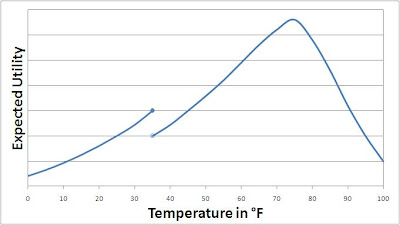Tuesday, December 22, 2009
Innovative marketing
Sunday, December 13, 2009
Religion, Science, Fear, Reason, and Turbulence
I was reading The Extended Phenotype, a book about evolution, by Richard Dawkins, a near militant atheist, on the plane ride to Philly. The guy next to me was reading the bible. At one point there was some turbulence, and it felt like near free fall for a second or two. I had my head down at the time, and noticed him jolt and grab the arm rests. I looked up and sort of grinned and he asked if I knew that was going to happen. I said no, it’s just turbulence.
I did not have a natural fear reaction like he did. My natural reaction was there must be some reason and everything will be ok. I think it may be because my conscious mind when it goes on a plane somehow turns off fear signals from the unconscious, but I’m not sure. But given our choices of reading material for the flight, I thought about a more interesting question: Are religious people more fearful than scientifically minded people? Is there causation in either direction? One purpose of religion seems to be to relieve people of fears about uncertainty in life (“God has a plan for me”, etc.). Are fearful people then drawn more to religion? My reaction of “there must be a reason for this” could certainly come from scientifically minded indoctrination, but also maybe I’m drawn to scientific thinking because I’m drawn to reason.
Thursday, December 10, 2009
Tuesday, December 8, 2009
Precipitation map of Chicago

Monday, December 7, 2009
Expected Utility by Temperature

Saturday, December 5, 2009
Thursday, December 3, 2009
My budget



I am slightly concerned about the eating out and drinking categories. In both October and November I was over budget in the categories. The reason I hesitate raising the budgets is that both of those categories in both October and November were characterized by under budget spending for 90% of the month, and then way over budget spending for 1 weekend each month when I had friends visiting. In October I spent just over $100 on eating out and drinking in the last 2 days of the month when I had visitors, compromising about half of my spending that month on those categories. In November I spent $85 on eating out and drinking over 3 days when I had visitors.
I don’t think I will have visitors this frequently in the future, so I am not raising the budget yet. I’d also like to try to spend less even when I do have visitors. December is not going to be an informative month because I will not be in Chicago for half of it, but January and February should be more like typical months. I will probably wait until the end of February when I will have 6 months of expenses recorded to adjust my budget further. I suspect I will be able to decrease the groceries budget by $20 or $30.
Wednesday, December 2, 2009
My first act as president
I'm sure there are those of you who believe that markets are perfect and hence we need only make clear umbrellas an option. However, empirical evidence, as well as theory suggests this is incorrect in the umbrella market. First of all, clear umbrellas are already available and we do not see everyone carrying around clear umbrellas. Secondly, there is a stigma attached to clear umbrellas that imposes a social cost to males who use a clear umbrella. This stigma should be removed.
Theoretically, a situation in which everyone carries a clear umbrella can not be a Nash equilibrium, because an individual would be better off carrying an opaque umbrella which would act as a credible threat. The rest of the people with clear umbrellas would avoid the opaque umbrella, and the opaque umbrella would bare none of the costs of avoiding sidewalk crashes. Empirical evidence shows that nearly everyone carrying an opaque umbrella is a stable equilibrium, and my intuition tells me that almost everyone carrying a clear umbrella would not be a stable equilibrium, if an equilibrium at all.
Since the social optimum can not exist in equilibrium, it is the government's responsibility to impose laws which send us to the social optimum, and as president, I would pledge to do so.
Tuesday, December 1, 2009
Why can’t there be markets in everything?
I think people should have to pay for leaning their seat back, and those behind them should be compensated. I have a strong preference for the person in front of me not leaning their seat back, and am more than willing to trade my upright seat for theirs. I’m sure there are people who prefer having their reclined seat and the seat in front of them reclined. If the airlines sort people correctly, there would really only need to be transfer payments between a few people who have their seat reclined and the seat in front of them upright to those people who have their seat upright and the seat in front of them reclined. There can be some sort of market when you buy your ticket where you give your price for having the seat in front of you upright and your price for having your seat upright. Then the airline picks the price to clear the market, and transfer payments ensue.
I recognize airlines probably are not going to do this, I’m not sure their customers will get it. I’m not sure how other people feel about the choice between (upright,upright) and (reclined,reclined) but if it is close to 50/50, they could easily just make one side of the plane upright and the other reclined. As it stands now, there is a transfer of utility from selfish people to good honest altruists like me who keeps his seat up.

